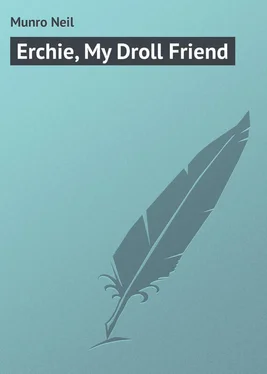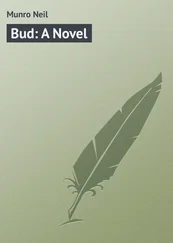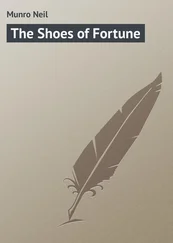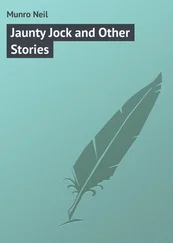Neil Munro - Erchie, My Droll Friend
Здесь есть возможность читать онлайн «Neil Munro - Erchie, My Droll Friend» — ознакомительный отрывок электронной книги совершенно бесплатно, а после прочтения отрывка купить полную версию. В некоторых случаях можно слушать аудио, скачать через торрент в формате fb2 и присутствует краткое содержание. ISBN: , Жанр: foreign_prose, на английском языке. Описание произведения, (предисловие) а так же отзывы посетителей доступны на портале библиотеки ЛибКат.
- Название:Erchie, My Droll Friend
- Автор:
- Жанр:
- Год:неизвестен
- ISBN:http://www.gutenberg.org/ebooks/47991
- Рейтинг книги:3 / 5. Голосов: 1
-
Избранное:Добавить в избранное
- Отзывы:
-
Ваша оценка:
- 60
- 1
- 2
- 3
- 4
- 5
Erchie, My Droll Friend: краткое содержание, описание и аннотация
Предлагаем к чтению аннотацию, описание, краткое содержание или предисловие (зависит от того, что написал сам автор книги «Erchie, My Droll Friend»). Если вы не нашли необходимую информацию о книге — напишите в комментариях, мы постараемся отыскать её.
Erchie, My Droll Friend — читать онлайн ознакомительный отрывок
Ниже представлен текст книги, разбитый по страницам. Система сохранения места последней прочитанной страницы, позволяет с удобством читать онлайн бесплатно книгу «Erchie, My Droll Friend», без необходимости каждый раз заново искать на чём Вы остановились. Поставьте закладку, и сможете в любой момент перейти на страницу, на которой закончили чтение.
Интервал:
Закладка:
“Oh, Erchie! dae ye mind when Willie was at the Normal?” said Jinnet.
“Oh, my! here it is already,” thought Erchie. “If that laddie o’ oors kent the hertbrek he was to his mither,nI wonder wad he bide sae lang awa’.”
“Yes, I mind, Jinnet; I mind fine. Whit for need ye be askin’? As I was sayin’, it’s aye in the common streets that things is happenin’ that’s worth lookin’ at, if ye’re game for fun. It’s like travellin’ on the railway; if ye gang first-cless, the wey I did yince to Yoker by mistake, ye micht as weel be in a hearse for a’ ye see or hear; but gang third and ye’ll aye find something to keep ye cheery if it’s only fifteen chaps standin’ on yer corns gaun to a fitba’-match, or a man in the corner o’ the cairrage wi’ a mooth-harmonium playin’ a’ the wye.”
“Oh! Erchie, look at the puir wean,” said Jinnet, turning to glance after a woman with an infant in her arms. “Whit a shame bringin’ oot weans on a nicht like this! Its face is blae wi’ the cauld.”
“Och! never mind the weans,” said her husband; “if ye were to mind a’ the weans ye see in Gleska, ye wad hae a bonnie job o’t.”
“But jist think on the puir wee smout, Erchie. Oh, dear me! there’s anither yin no’ three months auld, I’ll wager. It’s a black-burnin’ shame. It should be hame snug and soond in its wee bed. Does’t no’ mind ye o’ Willy when I took him first to his grannie’s?”
Her husband growled to himself, and hurried his step; but that night there seemed to be a procession of women with infants in arms in New City Road, and Jinnet’s heart was wrung at every crossing.
“I thocht it was pan-drops ye cam’ oot for, or conversation- losengers,” he protested at last; “and here ye’re greetin’ even-on aboot a wheen weans that’s no’ oor fault.”
“Ye’re a hard-herted monster, so ye are,” said his wife indignantly.
“Of course I am,” he confessed blythely. “I’ll throw aff a’ disguise and admit my rale name’s Blue-beard, but don’t tell the polis on me. Hard-herted monster – I wad need to be wi’ a wife like you, that canna see a wean oot in the street at nicht withoot the drap at yer e’e. The weans is maybe no’ that bad aff: the nicht air’s no’ waur nor the day air: maybe when they’re oot here they’ll no’ mind they’re hungry.”
“Oh, Erchie! see that puir wee lame yin! God peety him! – I maun gie him a penny,” whispered Jinnet, as a child in rags stopped before a jeweller’s window to look in on a magic world of silver cruet-stands and diamond rings and gold watches.
“Ye’ll dae naething o’ the kind!” said Erchie. “It wad jist be wastin’ yer money; I’ll bate ye onything his mither drinks.” He pushed his wife on her way past the boy, and, unobserved by her, slipped twopence in the latter’s hand.
“I’ve seen the day ye werena sae mean, Erchie MacPherson,” said his wife, vexatiously. “Ye aye brag o’ yer flet fit and yer warm hert.”
“It’s jist a sayin’; I’m as mooly’s onything,” said Erchie, and winked to himself.
It was not the children of the city alone that engaged Jinnet’s attention; they came to a street where now and then a young man would come from a public-house staggering; she always scanned the young fool’s face with something of expectancy and fear.
“Jist aboot his age, Erchie,” she whispered. “Oh, dear! I wonder if that puir callan’ has a mither,” and she stopped to look after the young man in his cups.
Erchie looked too, a little wistfully “I’ll wager ye he has,” said he. “And like enough a guid yin; that’s no’ forgettin’ him, though he may gang on the ran-dan; but in her bed at nicht no’ sleepin’, wonderin’ whit’s come o’ him, and never mindin’ onything that was bad in him, but jist a kind o’ bein’ easy-led, but mindin’ hoo smert he was when he was but a laddie, and hoo he won the prize for composeetion in the school, and hoo prood he was when he brocht hame the first wage he got on a Setturday. If God Almichty has the same kind o’ memory as a mither, Jinnet, there’ll be a chance at the hinderend for the warst o’ us.”
They had gone at least a mile from home, the night grew wetter and more bitter, the crowds more squalid, Jinnet’s interest in errant belated youth more keen. And never a word of the sweets she had made believe to come out particularly for. They had reached the harbour side; the ships lay black and vacant along the wharfs, noisy seamen and women debauched passed in groups or turned into the public-houses. Far west, into the drizzling night the river lamps stretched, showing the drumly water of the highway of the world. Jinnet stopped and looked and listened. “I think we’re far enough, Erchie; I think we’ll jist gang hame,” said she.
“Right!” said Erchie, patiently; and they turned, but not without one sad glance from his wife before they lost sight of the black ships, the noisy wharves, the rolling seamen on the pavement, the lamplights of the watery way that reaches to the world’s end.
“Oh! Erchie,” she said piteously, “I wonder if he’s still on the ships.”
“Like enough,” said her husband. “I’m shair he’s no’ in Gleska at onyrate without conin’ to see us. I’ll bate ye he’s a mate or a captain or a purser or something, and that thrang somewhere abroad he hasna time the noo; but we’ll hear frae him by-and-bye. The wee deevil! I’ll gie him’t when I see him, to be givin’ us such a fricht.”
“No’ that wee, Erchie,” said Jinnet. “He’s bigger than yersel’.”
“So he is, the rascal! am I no’ aye thinkin’ o’ him jist aboot the age he was when he was at the Sunday school.”
“Hoo lang is’t since we heard o’ him, Erchie?”
“Three or four years, or maybe five,” said Erchie, quickly. “Man! the wye time slips bye! It doesna look like mair nor a twelvemonth.”
“It looks to me like twenty year,” said Jinnet, “and it’s naething less than seeven, for it was the year o’ Annie’s weddin’, and her wee Alick’s six at Mertinmas. Seeven years! Oh, Erchie, where can he be? Whit can be wrang wi’ him? No’ to write a scrape o’ a pen a’ that time! Maybe I’ll no’ be spared to see him again.”
“I’ll bate ye whit ye like ye will,” said her husband. “And if he doesna bring ye hame a lot o’ nice things – shells and parrots, and bottles of scent, and Riga Balsam for hacked hands, and the rale Cheena cheeny, and ostrich feathers and a’ that, I’ll – I’ll be awfu’ wild at him. But the first thing I’ll dae’ll be to stand behind the door and catch him when he comes in, and tak’ the strap to him for the rideeculous wye he didna write to us.”
“Seeven years,” said Jinnet. “Oh, that weary sea, a puir trade to be followin’ for ony mither’s son. It was Australia he wrote frae last; whiles I’m feared the blecks catched him oot there and killed him in the Bush.”
“No! nor the Bush! Jist let them try it wi’ oor Willie! Dod! he would put the hems on them; he could wrastle a score o’ blecks wi’ his least wee bit touch.”
“Erchie.”
“Weel, Jinnet?”
“Ye’ll no’ be angry wi’ me; but wha was it tellt ye they saw him twa years syne carryin’ on near the quay, and that he was stayin’ at the Sailors’ Home?”
“It was Duffy,” said Erchie, hurriedly. “I have a guid mind to – to kick him for sayin’ onything o’ the kind. I wad hae kicked him for’t afore this if – if I wasna a beadle in the kirk.”
“I’m shair it wasna oor Willie at a’,” said Jinnet.
“Oor Willie! Dae ye think the laddie’s daft, to be in Gleska and no’ come to see his mither?”
“I canna believe he wad dae’t,” said Jinnet, but always looked intently in the face of every young man who passed them.
Читать дальшеИнтервал:
Закладка:
Похожие книги на «Erchie, My Droll Friend»
Представляем Вашему вниманию похожие книги на «Erchie, My Droll Friend» списком для выбора. Мы отобрали схожую по названию и смыслу литературу в надежде предоставить читателям больше вариантов отыскать новые, интересные, ещё непрочитанные произведения.
Обсуждение, отзывы о книге «Erchie, My Droll Friend» и просто собственные мнения читателей. Оставьте ваши комментарии, напишите, что Вы думаете о произведении, его смысле или главных героях. Укажите что конкретно понравилось, а что нет, и почему Вы так считаете.












